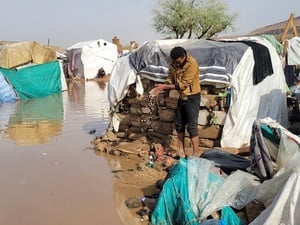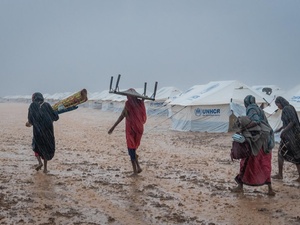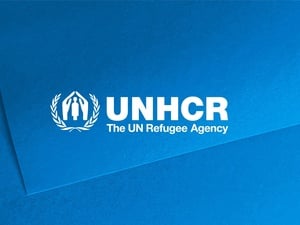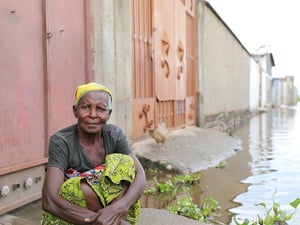Somalia: Relief supplies start reaching displaced to west of ghost-town capital
Somalia: Relief supplies start reaching displaced to west of ghost-town capital
UNHCR and its partners have completed a first round of distribution of urgently-needed relief supplies in the Somali region of Afgooye, some 30 kilometres west of Mogadishu. Several tons of plastic sheeting, mattresses, jerry cans, kitchen utensils and other supplies were distributed to 35,000 people displaced by the ongoing fighting in Mogadishu, who were sleeping rough under trees. They now at least have a shelter to protect them and their children from the scorching sun, the chilly nights and the soaking rains.
Another round of distribution is planned for tomorrow (Saturday) morning. It is intended to help another 13,500 people. The relief items were taken from UNHCR's emergency stockpiles in Dubai and airlifted to Baidoa. The items were then trucked some 200 kilometres from Baidoa to Afgooye. The trucks have now finally arrived in Afgooye after being blocked yesterday just outside the town as a bridge on the edge of Afgooye was closed since Tuesday by Ethiopian soldiers.
UNHCR Somali staff in Afgooye report that civilians are still fleeing Mogadishu at a very high rate, with the capital slowly turning into a ghost town, with half of its neighbourhoods now deserted. Estimates compiled by UNHCR from an extensive network of humanitarian agencies now place the total number of people who have fled Mogadishu at over 340,000, since fighting intensified at the beginning of February. This figure is expected to rise as new information becomes available to us.
The road linking Afgooye to Mogadishu is filled with a continuous flow of people fleeing the capital, and many residents of Afgooye fear that the fighting might spread to their town. The road has been closed many times over the past week due to explosions and military activity.
Meanwhile, the situation in Afgooye has grown increasingly chaotic. The town, which used to be safe, is now roamed by thugs who rob passers-by at gunpoint even in broad daylight, and who break into houses during the night. Many residents are trying to cope with the dramatic influx of displaced people, as most have to support relatives who have fled the fighting in the capital. The local community, which is extremely poor - most residents live on less than a dollar a day - must face the sharp increases in the prices of daily commodities such as food, water, housing and medicines, because of the huge demand. Some local shop and landowners are making a lot of money by charging extortionate prices. Along the road between Mogadishu and Afgooye, those who own land are reported to be charging displaced people a fee for just sitting under the shade of trees.
Among the 340,000 people who have fled the capital since February, an estimated 128,000 people have headed to the nearby Shabelle provinces (68,000 to Lower Shabelle and 60,000 to Middle Shabelle). Another 109,000 have gone to Galgaduud region, 38,000 to Mudug, 26,000 to Bay and 24,000 to Hiran.








